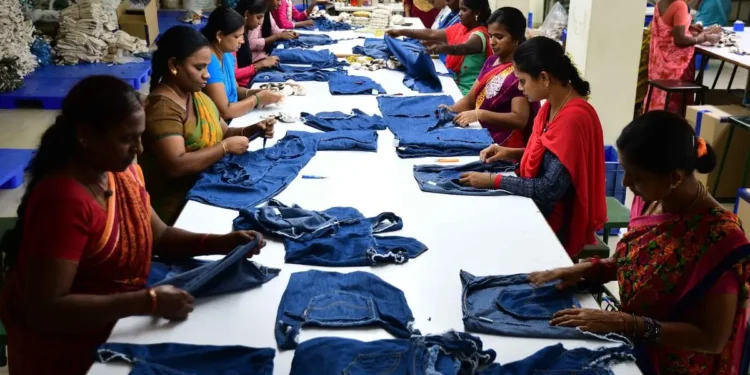Tamil Nadu, the southern state of India, has once again proven its dominance in the textile industry by accounting for 26.81% of India’s total textile exports. This is a significant increase from last year’s 20.78%, which clearly shows the state’s continuous growth and development in this sector. With this remarkable achievement, Tamil Nadu has widened its lead over Gujarat, the second highest exporting state in the country. This is a proud moment for the state and a testament to its strong textile industry.
The textile industry is one of the oldest and most important industries in India, contributing significantly to the country’s economy. And Tamil Nadu has been at the forefront of this industry, with its rich history and expertise in textile production. The state has a well-established textile infrastructure, including spinning mills, weaving units, and garment manufacturing units, which has helped it to maintain its position as the top textile exporting state in India.
The latest data released by the Ministry of Textiles shows that Tamil Nadu’s textile exports have increased by 6.03% in the last year, reaching a total of $6.5 billion. This is a remarkable achievement, considering the challenges posed by the COVID-19 pandemic. The state has shown resilience and adaptability in the face of the pandemic, which has helped it to maintain its growth trajectory.
One of the key factors contributing to Tamil Nadu’s success in the textile industry is its skilled workforce. The state has a large pool of skilled workers who are well-versed in the intricacies of textile production. This has helped the state to maintain its high-quality standards and meet the demands of the global market. The government of Tamil Nadu has also taken several initiatives to train and upskill the workforce, ensuring a continuous supply of skilled labor for the industry.
Moreover, the state has a favorable business environment, with a proactive government that has implemented various policies and schemes to support the growth of the textile industry. The state government’s efforts to provide a conducive business environment have attracted many textile companies to set up their operations in Tamil Nadu. This has not only boosted the state’s economy but also created employment opportunities for its people.
Tamil Nadu’s textile industry is also known for its diversity, with a wide range of products being exported to different parts of the world. The state is a major producer of cotton, silk, and synthetic fibers, which are used to make a variety of textiles such as yarn, fabrics, and garments. The state’s textile products are known for their quality, design, and competitive pricing, making them popular in the global market.
The state’s textile industry has also been a major contributor to the growth of the country’s overall textile exports. India’s textile exports have increased by 7.14% in the last year, reaching a total of $24.14 billion. Tamil Nadu’s share in this growth has been significant, and it has played a crucial role in maintaining India’s position as one of the top textile exporting countries in the world.
The rise in Tamil Nadu’s textile exports is a result of the state’s continuous efforts to modernize and upgrade its textile infrastructure. The state has been investing in new technologies and machinery to improve the efficiency and productivity of its textile units. This has not only helped the state to meet the growing demands of the global market but also reduced its production costs, making its products more competitive.
In conclusion, Tamil Nadu’s textile industry has once again proven its mettle by accounting for 26.81% of India’s total textile exports. The state’s continuous growth and development in this sector have widened its lead over other states, making it the top textile exporting state in the country. The state’s skilled workforce, favorable business environment, and diverse range of textile products have been the key factors behind its success. With the government’s support and the industry’s determination, Tamil Nadu’s textile industry is set to achieve even greater heights in the future.










